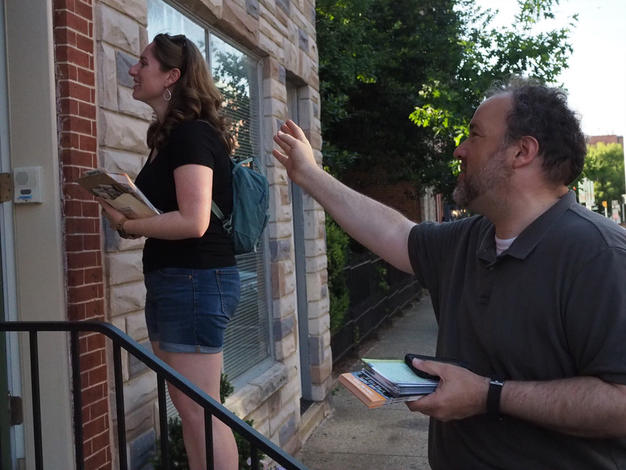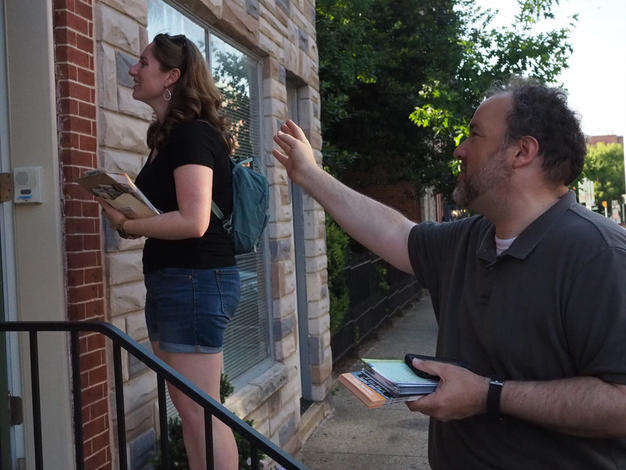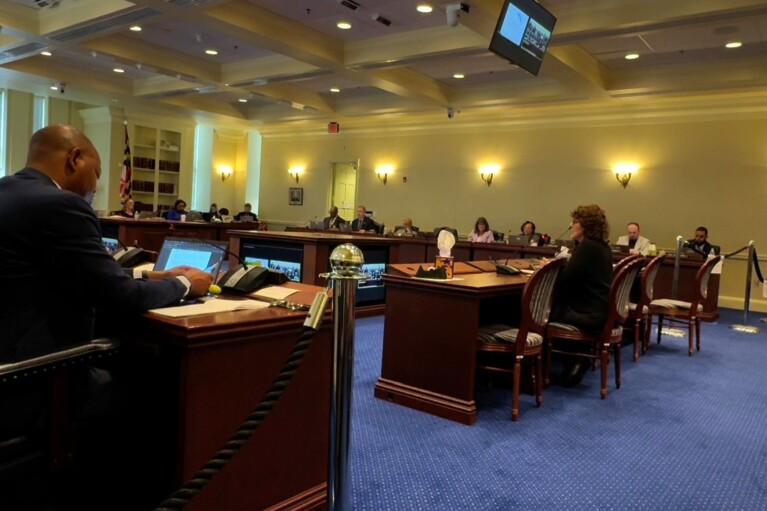Possible Changing of the Guard for Baltimore’s Democratic Foot Soldiers

By Samuel Manas
Late on a sunny Tuesday afternoon in the Locust Point neighborhood of Baltimore, state Del. Luke H. Clippinger, a campaign staffer and Paris Bienert are knocking on door after door, systematically making their way through District 46. This neighborhood, they say, is easy: the streets are all straight, and house numbers usually count upward as expected, without much interruption. Nothing like Cherry Hill, where streets are circuitous and house numbers change randomly. Clippinger is popular locally—people know him when they see him at their door and make small talk. But today, he’s not out knocking for himself, even though he’s up for reelection on Tuesday–he’s out knocking for Bienert’s candidacy for the Baltimore City Democratic Central Committee. A voter starts to chat with Clippinger, and the conversation turns to Bienert’s race. “How do you run for the central committee?” he says. “I don’t know anyone on the central committee.”It’s a frequent refrain, candidates say. “I’ve knocked on 3,500 doors and I could count on one hand how many people have told me they are familiar with what the central committee is,” Bienert said. Yet despite the lack of recognition at people’s doorsteps, interest in the central committee, like other downballot races this year, appears high: the Baltimore central committee has 42 seats, and this year an unprecedented 109 people are running in the primary for seats on the body. About half of the sitting members of the Democratic committee chose not to file for reelection, meaning that at least half of those seats will be filled by outsider candidates like 25-year-old Bienert, who are now vying to earn enough votes to start carrying out official Democratic party organizing work.  Del. Luke H. Clippinger and a campaign volunteer door-knock in the Locust Point neighborhood in Baltimore recently. But they weren’t there for Clippinger’s campaign; they were urging voters to support a young candidate for the Baltimore City Democratic Central Committee. Photo by Samuel Manas Many of the energetic first-time candidates tend to be young and tech-savvy, and some of them have loosely allied themselves into a group of 40 or so “like-minded people who want to see change in the party,” according to Alex Garcia, a central committee candidate in Northeast Baltimore’s District 43. When debate rages in the large Baltimore City Voters group on Facebook, Ben Smith, a candidate in District 40, and Braxton C. Street, another candidate in District 40, can sometimes be spotted in the comments. “Everybody’s got Facebook pages that they’re posting on and letting people know that they’re actually knocking doors and attending forums and so on,” Smith said. Building the farm team and grass-roots support The central committee is the “farm team” of the party, following marching orders to door-knock in support of Democrats, or to raise funds for the party. Then, when the time comes, some committee members run for office, having proved themselves adept at fundraising and campaigning. The state central committee serves a critical role in the Maryland Democratic Party. The 200-plus member committee meets only twice a year but coordinates several party functions. Members register and engage Democratic voters, encouraging their support for party candidates, including donations. But not all of their duties are at the grass-roots level: core to the organization’s purpose is its appointment power, used in the case of a state lawmaker resigning, dying or being otherwise removed from office. They also fill ballot vacancies and recommend individuals to the serve on the local Board of Elections. Baltimore City’s members of the state committee are elected like other local offices during the gubernatorial election, with the top seven vote-getters for each of Baltimore’s six legislative districts forming the basis of a district’s committee. After taking office the district appoints “at-large” members to balance out their gender ratio. While outsider candidates recognize the importance of the appointment power, some feel the focus is myopic, as get-out-the-vote efforts have been stunted in recent years. “There is a large impact that an organized, motivated, sustained, vigorous party apparatus could have on political life in Baltimore City that we haven’t been able to witness for a long time,” Garcia said. The increased attention is due to a collision of factors, including previous elections and high-visibility decisions that have left a negative impression on voters – if they’ve left an impression at all. 2016’s presidential election drove many central committee candidates to run, especially women, but the 2014 election of Gov. Lawrence J. Hogan Jr. (R) was also an incentive. That gubernatorial election left a lot of Democrats feeling dejected, after Hogan beat then-Lt. Gov. Anthony Brown (D) by 65,000 votes. Baltimore had 290,000 registered Democrats, but its turnout rate of 36 percent meant that a significant portion of the difference could have been made up with higher Democratic turnout in the city. “We need the party to be giving people a concrete reason why they should go to the polls, to be inspiring them to do so and then to be facilitating that process, and in every respect, the party could be doing a better job than it’s doing,” Garcia said. The saga of former state Sen. Nathaniel T. Oaks, who also served on the central committee, was another factor that motivated people to run. A former delegate once convicted of theft in office, Oaks was recommended by the 41st District committee as a replacement for former state Sen. Lisa A. Gladden (D), who resigned in early 2017 due to failing health. Within 13 months of his appointment, Oaks pleaded guilty to federal corruption charges, and faces sentencing next month. The vote for his replacement in the Senate – which Oaks could have participated in, though he didn’t – ended in a tie, and Hogan wound up making the final appointment. Most people involved in city politics say that the party has not adequately performed some of its basic functions in a long time. Voters see it, too. “It’s nice to be able to tap into this sort of roiling feeling that the party’s base hasn’t been taken seriously, that the Democrats aren’t performing the way that they need to for the city specifically,” said Smith, the central committee candidate in District 40. Bienert is not the only candidate taking the race seriously. ’85 doors a day’ “I have to average about 85 doors a day in order to make sure I’m hitting my base, which means I knock around three hours every day,” Smith said. “Sometimes that’s down on weeknights and I make up for it on the weekends… If I lose, it will be because voters did not like what I had to say or just didn’t buy into me, and I can live with that. What I can’t live with is having phoned it in.” Outsider candidates argue the committee has problems engaging its own members. In a blog post, Smith showed the committee’s attendance rates for 2015 and 2016 hovered around 50 percent for most districts – and under 40 percent in the 46th District. There have been few consequences for central committee members who don’t show up. “I don’t think that you should be permitted to miss over half of the 12 meetings that take place in a year and get to keep that on your resume,” Garcia said. Odette Ramos oversaw a revamp of the organization’s bylaws in 2015 and focused on the issue of attendance, but acknowledged that more changes are needed. “We never really found a good way to deal with compliance,” she said. “We can definitely do better about that.” Some of the turnout issue, candidates say, is rooted in the body’s lack of community engagement. “They do not publicize when meetings occur with any degree of regularity” Garcia said. “They do not do a lot of community outreach. They do not publicize their attendance records. And they do not regularly publicize the minutes of what was discussed at those meetings. That all needs to change.” Sitting members like Ramos called the committee’s lackluster performance in recent years a product of inertia. “We have people who have been on central committee for a long time and they’re just not doing the work. Many of them are not running again.” The absenteeism is palpable at meetings. The central committee’s May session, also attended by prospective gubernatorial candidates, was scheduled for 6:30 p.m., but started at 6:50. The body reached quorum and began to discuss agenda items at around 7:20. Some of the criticism that outsider candidates level at the central committee is warranted, Ramos noted – but not all of it. “There’s always that tension because the people in the office are like, ‘look, this is the reality.’ … I’ve been in forums where some of the central committee candidates are talking about the role of the central committee and it’s not right.” John T. Willis, a former Maryland secretary of state and now a professor at the University of Baltimore, sees Hogan’s first election as anomalous, and said organized and motivated central committees can help defeat him this fall. One thing that all Baltimore City central committee candidates have been unified on is unseating Hogan. Street also raised the possibility of central committee members leaving Baltimore’s boundaries. “We need to go out there and put our energy behind those people from a party standpoint that are in vulnerable races,” he said. “’14 was an aberration,” Willis said. “Whoever wins the central committee, you put them in the room with a good political organizer, they can recreate that in 30 days.” “Local central committees go through periods of inactivity and weakness,” he said. What matters in Baltimore elections, Willis says, is what happens after the election. Should the people who win infuse the body with more vigor, it’s possible for Baltimore’s central committee to prove itself. “If they get $100,000 in their treasury, someone will start paying attention to them,” he said.
Del. Luke H. Clippinger and a campaign volunteer door-knock in the Locust Point neighborhood in Baltimore recently. But they weren’t there for Clippinger’s campaign; they were urging voters to support a young candidate for the Baltimore City Democratic Central Committee. Photo by Samuel Manas Many of the energetic first-time candidates tend to be young and tech-savvy, and some of them have loosely allied themselves into a group of 40 or so “like-minded people who want to see change in the party,” according to Alex Garcia, a central committee candidate in Northeast Baltimore’s District 43. When debate rages in the large Baltimore City Voters group on Facebook, Ben Smith, a candidate in District 40, and Braxton C. Street, another candidate in District 40, can sometimes be spotted in the comments. “Everybody’s got Facebook pages that they’re posting on and letting people know that they’re actually knocking doors and attending forums and so on,” Smith said. Building the farm team and grass-roots support The central committee is the “farm team” of the party, following marching orders to door-knock in support of Democrats, or to raise funds for the party. Then, when the time comes, some committee members run for office, having proved themselves adept at fundraising and campaigning. The state central committee serves a critical role in the Maryland Democratic Party. The 200-plus member committee meets only twice a year but coordinates several party functions. Members register and engage Democratic voters, encouraging their support for party candidates, including donations. But not all of their duties are at the grass-roots level: core to the organization’s purpose is its appointment power, used in the case of a state lawmaker resigning, dying or being otherwise removed from office. They also fill ballot vacancies and recommend individuals to the serve on the local Board of Elections. Baltimore City’s members of the state committee are elected like other local offices during the gubernatorial election, with the top seven vote-getters for each of Baltimore’s six legislative districts forming the basis of a district’s committee. After taking office the district appoints “at-large” members to balance out their gender ratio. While outsider candidates recognize the importance of the appointment power, some feel the focus is myopic, as get-out-the-vote efforts have been stunted in recent years. “There is a large impact that an organized, motivated, sustained, vigorous party apparatus could have on political life in Baltimore City that we haven’t been able to witness for a long time,” Garcia said. The increased attention is due to a collision of factors, including previous elections and high-visibility decisions that have left a negative impression on voters – if they’ve left an impression at all. 2016’s presidential election drove many central committee candidates to run, especially women, but the 2014 election of Gov. Lawrence J. Hogan Jr. (R) was also an incentive. That gubernatorial election left a lot of Democrats feeling dejected, after Hogan beat then-Lt. Gov. Anthony Brown (D) by 65,000 votes. Baltimore had 290,000 registered Democrats, but its turnout rate of 36 percent meant that a significant portion of the difference could have been made up with higher Democratic turnout in the city. “We need the party to be giving people a concrete reason why they should go to the polls, to be inspiring them to do so and then to be facilitating that process, and in every respect, the party could be doing a better job than it’s doing,” Garcia said. The saga of former state Sen. Nathaniel T. Oaks, who also served on the central committee, was another factor that motivated people to run. A former delegate once convicted of theft in office, Oaks was recommended by the 41st District committee as a replacement for former state Sen. Lisa A. Gladden (D), who resigned in early 2017 due to failing health. Within 13 months of his appointment, Oaks pleaded guilty to federal corruption charges, and faces sentencing next month. The vote for his replacement in the Senate – which Oaks could have participated in, though he didn’t – ended in a tie, and Hogan wound up making the final appointment. Most people involved in city politics say that the party has not adequately performed some of its basic functions in a long time. Voters see it, too. “It’s nice to be able to tap into this sort of roiling feeling that the party’s base hasn’t been taken seriously, that the Democrats aren’t performing the way that they need to for the city specifically,” said Smith, the central committee candidate in District 40. Bienert is not the only candidate taking the race seriously. ’85 doors a day’ “I have to average about 85 doors a day in order to make sure I’m hitting my base, which means I knock around three hours every day,” Smith said. “Sometimes that’s down on weeknights and I make up for it on the weekends… If I lose, it will be because voters did not like what I had to say or just didn’t buy into me, and I can live with that. What I can’t live with is having phoned it in.” Outsider candidates argue the committee has problems engaging its own members. In a blog post, Smith showed the committee’s attendance rates for 2015 and 2016 hovered around 50 percent for most districts – and under 40 percent in the 46th District. There have been few consequences for central committee members who don’t show up. “I don’t think that you should be permitted to miss over half of the 12 meetings that take place in a year and get to keep that on your resume,” Garcia said. Odette Ramos oversaw a revamp of the organization’s bylaws in 2015 and focused on the issue of attendance, but acknowledged that more changes are needed. “We never really found a good way to deal with compliance,” she said. “We can definitely do better about that.” Some of the turnout issue, candidates say, is rooted in the body’s lack of community engagement. “They do not publicize when meetings occur with any degree of regularity” Garcia said. “They do not do a lot of community outreach. They do not publicize their attendance records. And they do not regularly publicize the minutes of what was discussed at those meetings. That all needs to change.” Sitting members like Ramos called the committee’s lackluster performance in recent years a product of inertia. “We have people who have been on central committee for a long time and they’re just not doing the work. Many of them are not running again.” The absenteeism is palpable at meetings. The central committee’s May session, also attended by prospective gubernatorial candidates, was scheduled for 6:30 p.m., but started at 6:50. The body reached quorum and began to discuss agenda items at around 7:20. Some of the criticism that outsider candidates level at the central committee is warranted, Ramos noted – but not all of it. “There’s always that tension because the people in the office are like, ‘look, this is the reality.’ … I’ve been in forums where some of the central committee candidates are talking about the role of the central committee and it’s not right.” John T. Willis, a former Maryland secretary of state and now a professor at the University of Baltimore, sees Hogan’s first election as anomalous, and said organized and motivated central committees can help defeat him this fall. One thing that all Baltimore City central committee candidates have been unified on is unseating Hogan. Street also raised the possibility of central committee members leaving Baltimore’s boundaries. “We need to go out there and put our energy behind those people from a party standpoint that are in vulnerable races,” he said. “’14 was an aberration,” Willis said. “Whoever wins the central committee, you put them in the room with a good political organizer, they can recreate that in 30 days.” “Local central committees go through periods of inactivity and weakness,” he said. What matters in Baltimore elections, Willis says, is what happens after the election. Should the people who win infuse the body with more vigor, it’s possible for Baltimore’s central committee to prove itself. “If they get $100,000 in their treasury, someone will start paying attention to them,” he said.



 Creative Commons Attribution
Creative Commons Attribution